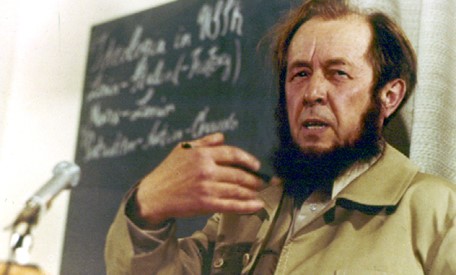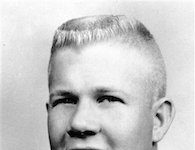On February 14, 1974, Alexander Solzhenitsyn, the Russian writer who revealed the horrors of the Soviet gulag, was charged with treason a day after being deported to West Germany.
Solzhenitsyn Deported for “The Gulag Archipelago”
Alexander Solzhenitsyn’s role as a dissident began in 1945, when he was arrested while fighting in World War II for criticizing Joseph Stalin in a letter. He was sentenced to eight years in hard labor camps in Central Russia. It was at there that he witnessed the abuses of the Russian prison system firsthand, using his experiences to write his first novel, “One Day in the Life of Ivan Denisovitch.”
He also interviewed other prisoners and memorized what they said; he drew on these interviews to write his most famous work, “The Gulag Archipelago,” an account of Russian gulags.
“It turned a mealy-mouthed, bureaucratic, obscure term describing the state management of labor camps—that crazy little word Gulag has now become a metaphor on the scale, almost, of the Holocaust,” says biographer Michael Scammell.
Parts of the piece were published in Paris in December 1973 after being smuggled out of the USSR. The book attracted tremendous attention in the West and changed the way many people felt about the USSR. It was also smuggled back into the Soviet Union, which prompted Soviet authorities to take action against Solzhenitsyn.
On February 12, 1974, seven KGB agents took Solzhenitsyn from his home in Moscow and transported him to Lefortovo Prison, where he was strip-searched, interrogated for hours, and told he would face the death penalty. The next day Solzhenitsyn was flown to Frankfurt, Germany. A day later, the Soviet Union formally expelled Solzhenitsyn on charges of treason.
“In the last analysis, the deportation was an act of weakness and desperation—an admission that the Soviet system holds no answer in law or fact or argument to meet Solzhenitsyn’s challenge,” said Time magazine correspondent John Shaw. “Unable to answer his charges, incompetent to silence him, afraid to imprison him and incapable of tolerating his opinions, the Soviet state had no other option but to declare him a non-person.”
Sources in this Story
- NPR: Solzhenitsyn Shook Soviet System’s Foundation
- Time: Solzhenitsyn: An Artists Becomes an Exile
- Nobel Foundation: The Nobel Prize in Literature 1970
- PBS: NewsHour: Russian Author Aleksandr Solzhenitsyn Dies at 89
- NPR: Alexander Solzhenitsyn, A ‘Man With A Mission’
- Russian Info-Centre: Alexander Solzhenitsyn
- The Daily Telegraph: Nobel laureate Alexander Solzhenitsyn dead
- American Rhetoric: Alexander Solzhenitsyn: A World Split Apart
Biography: Alexander Solzhenitsyn
Alexander Solzhenitsyn was born on December 11, 1918, in Kislovodsk in the Caucasus region of Russia. Although he always wanted to be a writer, for financial reasons he studied physics and mathematics at Rostov University. He entered the military during World War II and commanded a squadron in East Prussia before he was arrested for criticizing Stalin.
He was a devoted communist who believed that Stalin and the Soviet system had betrayed the cause. He found that “true communism was a distant ideal and that the Soviet regime had turned into virtually its opposite, but like many idealists he wasn’t prepared just to stop there,” said Michael Scammell. “He had a burning desire both to expose this hypocrisy.”
He developed a cancerous tumor in 1950 and nearly died before he was allowed into a cancer clinic in 1954. After his imprisonment, he was exiled for three years. In 1956 he was allowed to return to Russia, where he taught math in a small village and wrote in secret.
“During all the years until 1961, not only was I convinced that I should never see a single line of mine in print in my lifetime, but, also, I scarcely dared allow any of my close acquaintances to read anything I had written because I feared that this would become known,” he wrote for his Nobel Prize autobiography.
When Nikita Khrushchev took power, many Stalinist policies were loosened, and Solzhenitsyn submitted “One Day in the Life of Ivan Denisovich” to a literary journal in the USSR. It was published in 1962 and in English a year later. Solzhenitsyn became famous in the USSR and continued to write, publishing two short stories.
But Khrushchev was forced out of power in 1964 and the policies that had been relaxed were tightened. Solzhenitsyn’s criticism of the government earned him harassment and publishing prohibitions. He was forced to publish his work abroad, illegally, which did not endear him to Soviet authorities.
Solzhenitsyn’s Work
- “One Day in the Life of Ivan Denisovich”
- “The Gulag Archipelago”
- “In the First Circle”
- “Cancer Ward”
- “The Solzhenitsyn Reader”
He was expelled from the Soviet Writers’ Union in 1969 after he denounced state censorship. A year later he won the Nobel Prize for Literature, but refrained from attending the award ceremony as he was afraid he wouldn’t be allowed to return to Russia.
During his Nobel acceptance speech, he remarked that writers and artists are obligated to wage a war against the violence of the world. “Violence finds its only refuge in falsehood,” he said. “And no sooner will falsehood be dispersed than the nakedness of violence will be revealed in all its ugliness—and violence, decrepit, will fall.”
After his expulsion and move to America, he “became a cause celebre in the West, where he continued to study and write works largely critical of the Soviet regime,” according to The Daily Telegraph.
But Solzhenitsyn was also critical of western culture; in making the 1978 Harvard commencement address, Solzhenitsyn declared, “The persisting blindness of superiority continues to hold the belief that all the vast regions of our planet should develop and mature to the level of contemporary Western systems.”
As the Soviet Union fell, interest in Solzhenitsyn’s work rose among citizens there. A literary magazine published excerpts of “The Gulag Archipelago” in 1989, and his citizenship was restored in 1990. He died in Moscow in August 2008 of heart failure.











